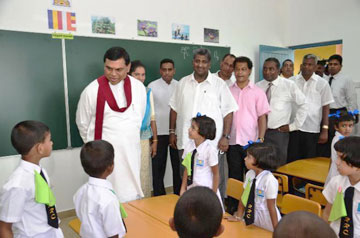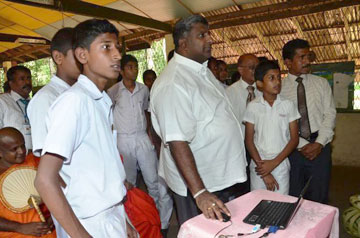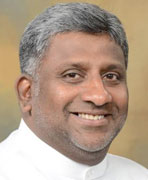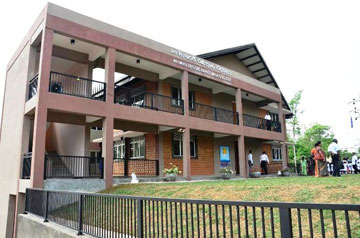Improving Western Province education sector
By Ranil Wijayapala
The Western Province which shares the highest Gross Domestic Product
of the country and all other physical and human resources has always
ranked first in all sectors in terms of development in the country. It
maintained the highest reputation for its education among all nine
provinces in the country and recorded the best results in school
education as it inherits both physical and human resources in terms of
education in the country.
 |
| Improving the
primary education in the province by providing student-friendly
classrooms |
 |
| Introducing
information technology to schools in the Western Province |
 |
|
Western Province Chief
Minister and Education Minister Prasanna Ranathunga |
When we analyse the performance of education in terms of examination
results, it seems that the Western Province is losing its grip over best
education performance, except from the G.C.E. (O/L) examination results
during the past few years.
When students from other provinces come out with good performances at
national level examinations, it highlights the performance of Western
Province schools as it used to take the lead in all examinations in the
past.
However, there is a big story behind the education performance of the
province as its performance in education is influenced by many factors.
Prasanna Ranathunga who held the portfolio of Education Minister in the
province since his first appointment as the Chief Minister in 2009 and
again in 2014 for the second consecutive term, is continuing his efforts
to improve the performance of education in the province.
Explaining the situation, Chief Minister Prasanna Ranathunga said
that although the education sector in the western province painted a
bright picture to other parts of the country, when he took over the
education subject in 2009 it had many shortcomings.
"Some of the problems faced by the school education sector were
common to all parts of the country due to the conflict situation of the
country but there were many problems which were inherent to the western
province", he said.
Though the immense physical resources inherited by these schools
seems to be a blessings they have become a big burden to those schools
as there was no means to maintain them properly due to lack of funds and
human capital. Apart from that, buildings with only foundation stones
and a large number of half built buildings that existed for years have
become a big problem to these schools.
"We had a vision to develop the education sector in the province and
we started to work out that vision into a reality by creating a better
school environment for the students after mobilising all human and
physical resources to clean and colour-wash all the school buildings in
all 1,267 schools in the province allocating Rs. 372 million for this
purpose", the Minister said.
Steps were also taken to construct 128 school buildings which had
only foundation stones and completed another 110 half built school
buildings allocating Rs.300 million in 2011 and Rs. 400 million in 2012.
For the improvement of physical resources and maintaining them we have
increased the allocation Rs. 800 million in 2009 to Rs. 1,600 million
per year.
The Zonal Education Offices and the Divisional Education Offices were
also developed after equipped them with computer and other modern
facilities.
Giving physical resources alone will not develop the quality of the
education. "Therefore, we need to develop the human resources of the
schools as well", the Chief Minister said.
In terms of filling teacher vacancies in the province it has
recruited 11,400 graduate teachers based on the competitive exam held to
recruit graduates as teachers to the western province schools and now we
are maintaining 21:1 pupils and teacher ratio in the provincial schools.
"We have filled more than 96 to 98 percent teacher vacancies in all
these schools and we are going to recruit more teachers after conducting
another competitive examination this year", the Minister said.
 Since recruitment of teachers alone won't help develop the school
education the Provincial Education Ministry is taking steps to train all
the primary level graduate teachers as there is shortage of trained
primary teachers in most of the schools. Since recruitment of teachers alone won't help develop the school
education the Provincial Education Ministry is taking steps to train all
the primary level graduate teachers as there is shortage of trained
primary teachers in most of the schools.
As education alone will not make good citizens the Provincial
Education Ministry has also taken initiatives to improve good qualities
among students as it helps create a good society.
"Schools cannot commit on long-term basis for such programs, so we
thought of taking assistance from the Dhamma schools in the province and
increasing the number of students attending Dhamma schools. For that we
allocated Rs.100,000 for each and every Dhamma School in the province
irrespective of the religion to improve the physical resources of the
Dhamma schools", the Minister said.
Despite the improvement of the physical resources and human resources
of the school education system there is something lacking in the
education system in the Western Province. "Though we are considered the
most developed province in all aspects we see that other provinces too
are developing their education system with lesser facilities. So we had
to change the attitudes of the education officials in the western
province to bring an end to this stalemate situation", the Minister
said.
In this regard the Ministry had consulted educational experts and had
conducted seminars and workshops for the education officers from the
Education Secretary to school principals to line up them to achieve one
target in education performance.
"As politicians we can provide all what is required to improve the
education system. Taking that system into new horizons is at the hands
of these officials and teachers. But we are determined to achieve our
targets in education in keeping with Mahinda Chinthana program to make
Sri Lanka the education hub in Asia when making Sri Lanka the miracle of
Asia", the Minister said.
Secretary to the Education Ministry of the Western Province Bandula
Daya Senerath explaining the factors that are influencing the education
performance in the province, said that the huge diversity of student
population in the province is also making a great impact on the school
education system in the western province.
"The Western province is comprised the population from the richest
people to the poorest people representing various strata of society from
shanty dwellers to top brass business people.
So they are having diverse attitudes towards the school education and
many of them want to improve their income levels rather than school
education", the Secretary said.
"The numbers of students not attending schools are much higher in the
western province compared to other province. The Negombo coastal belt
has the highest number of school drop-outs in the province due to their
engagement in the tourism sector and the fisheries sector", he said.
According to him the target of achieving 100 percent school education
in 2017, it has become difficult target for the province as the number
of school drop-outs in the province is very high between the ages of 10
to 16.
"The family background of the students living in urban settlements
and wards and the coastal belt in Negombo and other coastal areas and
the parents attitude towards school education has hampered their school
education", he said.
To overcome this situation the Western Province has implemented a
program to get back the children in schooling age back to the school
even before the implementation of the national program which was started
on October 1.
"From January to September this year alone 450 students drop-outs
from the schools were directed for school education", he said. With
regard to progress in the primary education the Western Province is
ranked 6th place last year based on the Grade 5 scholarship exam
results.
"We are getting lower rank in primary education as most of the
students sitting for the grade 5 scholarship examination are having less
enthusiasm as they are already having popular schools. Therefore our
position in the primary education is lower than other provinces", he
said.
However, the Western Province has been able to keep the first place
in the G.C.E. (O/L) examination. "We are trying to maintain this
position by giving targets for the schools to improve the pass rates in
the O/L examination and conduct seminars and workshops for the students
who are recording weak results at term tests and monthly tests", he
said.
To improve the pass rates in Maths, Science and English subjects for
the teachers of these subjects, the Ministry is conducting workshops for
all the teachers from the O/L classes to improve their results. "We are
paying much attention for the schools which have shown poor performances
in these subjects", he said.
At the G.C.E. (A/L) results we are ranked lower than other provinces
when taking overall performance of the A/L students. But with regard to
Maths and Science subjects results Western Province is ranked first
among the nine provinces and third place with regard to the commerce
subject stream results.
Our overall performance at the G.C.E. (A/L) is poor because the
number of students following science subjects are higher in the province
compared to the Arts subjects.
"Therefore, the number of students qualifying for the university
education is less in the western province compared to the other
provinces of the country", he said.
"In keeping with the national education policy we are trying our best
to produce more and more science educated students rather than producing
higher number of arts subjects qualified students", he said.
He said that President Mahinda Rajapaksa is always extending his hand
to the Chief Minister to improve the education system in the Western
Province while Economic Development Minister Basil Rajapaksa has also
committed to provide Rs. 4,000 million for the improvement of physical
resources in schools.
"Our intention is to make our contribution to the government effort
to make Sri Lanka the education hub in Asia in its march to make Sri
Lanka the miracle of Asia by producing more and more science and
technology educated students to the job market", Bandula Daya Senerath
said. |

